Patricia Fara
Collecting Cuttlefish on Lesbos
The Lagoon: How Aristotle Invented Science
By Armand Marie Leroi
Bloomsbury 512pp £25
Aristotle and Plato – their names conjure up thoughts of stone busts showing serene elderly men with long curly beards. Perhaps these revered Greek philosophers really did look like that at some stage in their lives, but according to the evolutionary biologist Armand Marie Leroi, Plato was so irascible that he once threw his favourite dog down a well and his student Aristotle was an overdressed dandy who compensated for his small eyes and thin legs by sporting plenty of jewellery and an elaborate hairstyle. Leroi also sets out to challenge traditional impressions of their intellectual activities. He makes little mention of the usual philosophical sound bites – shadows on the walls of a cave or syllogistic puzzles about the mortality of men. Instead, in Leroi’s revisionist version of the Academy in Athens, Plato emerges as an anti-scientific mythmaker mindlessly obsessed with numbers, while Aristotle is cast as the world’s first scientist and the founding father of biology.
As the title of Leroi’s latest book, The Lagoon: How Aristotle Invented Science, suggests, Aristotle is Leroi’s scientific hero, the essential precursor of Georges Cuvier, Charles Darwin, Gregor Mendel and all the other great men of the life sciences (virtually the only reference to women occurs when the author exchanges

Sign Up to our newsletter
Receive free articles, highlights from the archive, news, details of prizes, and much more.@Lit_Review
Follow Literary Review on Twitter
Twitter Feed
Though Jean-Michel Basquiat was a sensation in his lifetime, it was thirty years after his death that one of his pieces fetched a record price of $110.5 million.
Stephen Smith explores the artist's starry afterlife.
Stephen Smith - Paint Fast, Die Young
Stephen Smith: Paint Fast, Die Young - Jean-Michel Basquiat: The Making of an Icon by Doug Woodham
literaryreview.co.uk
15th-century news transmission was a slow business, reliant on horses and ships. As the centuries passed, though, mass newspapers and faster transport sped things up.
John Adamson examines how this evolution changed Europe.
John Adamson - Hold the Front Page
John Adamson: Hold the Front Page - The Great Exchange: Making the News in Early Modern Europe by Joad Raymond Wren
literaryreview.co.uk
"Every page of "Killing the Dead" bursts with fresh insights and deliciously gory details. And, like all the best vampires, it’ll come back to haunt you long after you think you’re done."
✍️My review of John Blair's new book for @Lit_Review
Alexander Lee - Dead Men Walking
Alexander Lee: Dead Men Walking - Killing the Dead: Vampire Epidemics from Mesopotamia to the New World by John Blair
literaryreview.co.uk